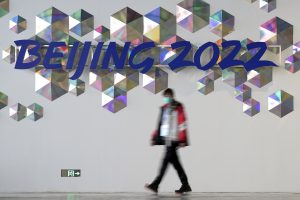The Cold War is long over, but one might not realize it from the media coverage of the calls to boycott the upcoming Winter Olympics in Beijing, which will take place from February 4 to 20. In December, U.S. President Joe Biden announced a “diplomatic boycott” of the 2022 Olympics in protest against the suppression of the Uyghur minority in the Chinese region of Xinjiang, which Washington has officially labeled a “genocide.” The use of the word “boycott” in the context of the Olympics conjures up the twin boycotts that became a memorable symbol of the Cold War, when the United States led a boycott by more than 60 nations of the Moscow 1980 Olympics and the USSR retaliated by leading a 14-nation boycott of the Los Angeles 1984 Olympics. (China and Romania actually broke the Soviet boycott and attended the Los Angeles Olympics.)
Leading up to the 2022 Winter Olympics, the call for boycotts gives the false impression that nothing has changed since the Cold War ended – not the Olympic Games, not China, and not the U.S.-led global order. But, in fact, all three have changed a great deal. To see the difference, it is only necessary to compare China’s first Olympics in 2008 with its second in 2022.
The Bids: 2008 and 2022
East Asian interest in hosting Olympic Games is often viewed with surprise in the West owing to the perception that these countries lack a sporting heritage like that of the West. But sports mega-events have long played a role in regional rivalries in East Asia, going back to the early 20th century, when East Asia became the first world region to have its own regional, multi-sport games, the Far Eastern Championship Games. Established in 1913, they continued every four years until the Japanese occupation of northeast China ended the games after 1934.
Arguably, Japan and China, and later Korea, have invested inter-state sports events and exchanges with more political importance than the West has, in part because of the importance of official pomp and ceremony in East Asian political culture. China’s Ping Pong Diplomacy in the 1970s was another example. Japan and South Korea utilized the hosting of Summer Olympics in 1964 and 1988, respectively, to mark their emergence on the world stage and their peaceful reintegration into the global community after war. Based on this precedent, China sought to do the same.
When China hosted its first Olympic Games, the Summer Olympics in 2008, the significance of the mega-event was clear to audiences both inside and outside China. It was widely seen as a “coming-out party” marking China’s emergence as an economic superpower. In China, it was considered the fulfillment of China’s “100-year dream,” because the first published call to host the Olympic Games, thus demonstrating that China had taken its place as an equal among the strong nations of the world, had been issued by YMCA-trained patriots in 1907.
The situation was very different when China bid for its first Winter Olympics in 2015. China had already had its coming-out party. Its economic stability during the global financial crisis that erupted soon after the 2008 games had helped to establish China as a worthy global partner.
So, for the Chinese leadership, what were the objectives of hosting these Olympic Games?

































